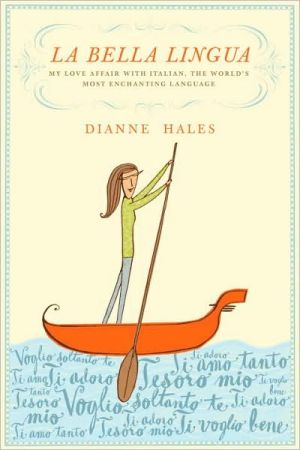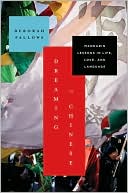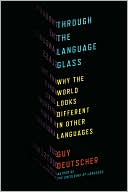La Bella Lingua: My Love Affair with Italian, the World's Most Enchanting Language
“Italians say that someone who acquires a new language ‘possesses’ it. In my case, Italian possesses me. With Italian racing like blood through my veins, I do indeed see with different eyes, hear with different ears, and drink in the world with all my senses…”\ \ A celebration of the language and culture of Italy, La Bella Lingua is the story of how a language shaped a nation, told against the backdrop of one woman’s personal quest to speak fluent Italian.\ For anyone who has been to Italy,...
Search in google:
For anyone who has been to Italy, the fantasy of living the Italian life is powerfully seductive. But to truly become Italian, one must learn the language. This is how Dianne Hales-began her journey. In La Bella Lingua, she brings the story of her decades-long experience with "the world's most loved and lovable language" together with explorations of Italy's history, literature, art, music, movies, lifestyle, and food in a true opera amorosa—a labor of her love of Italy.Dianne offers charming insights into what makes Italian the most emotionally expressive of languages, from how the pronto ("Ready!") Italians say when they answer the telephone conveys a sense of something coming alive, to how even ordinary things such as a towel (asciugamano) or handkerchief (fazzoletto) sound better in Italian, and she invites readers to join her as she traces the evolution of Italian in the zesty graffiti on the walls of Pompeii, in Dante's incandescent cantos, and in Boccaccio's bawdy Decameron.Like Dianne, readers of La Bella Lingua will find themselves innamorata, enchanted, by Italian, fascinated by its saga, tantalized by its adventures, addicted to its sound, and ever eager to spend more time in its company. Publishers Weekly In this charming love letter to the language and culture of Italy, journalist Hales recounts her inebriation with Italian's sounds and her lovesickness over its phrases. Enamored of this lovely and lovable language, Hales immerses herself in Italian culture on numerous trips to Italy in her attempt to "live Italian." She comes to think of Italian as "a lovable rascal, a clever, twinkle-eyed scamp that you can't resist even when it plays you for a fool." Hales regales us with the mysteries of the language, such as when a color becomes more than hue. She tells us that yellow, for example, refers to a mystery "because thrillers traditionally had yellow covers." In her rapture over the language, she also swoons over Italian literature (from Dante to Manzoni), opera (Verdi and Puccini) and cinema (Marcello Mastroianni and Fellini) as she rehearses the many ways in which the language has seductively slipped into Western culture and consciousness. (May)Copyright © Reed Business Information, a division of Reed Elsevier Inc. All rights reserved.
Acknowledgments xvIntroduction: My Italian Brain and How It Grew 1Confessions of an Innamorata 13The Unlikely Rise of a Vulgar Tongue 35To Hell and Back with Dante Alighieri 59Italian's Literary Lions 79The Baking of a Masterpiece 102How Italian Civilized the West 122La Storia dell'Arte 142On Golden Wings 164Eating Italian 190So Many Ways to Say "I Love You" 211Marcello and Me 235Irreverent Italian 256Mother Tongue 274Glossary 291Bibliography 301Reader's Guide 312
\ Publishers WeeklyIn this charming love letter to the language and culture of Italy, journalist Hales recounts her inebriation with Italian's sounds and her lovesickness over its phrases. Enamored of this lovely and lovable language, Hales immerses herself in Italian culture on numerous trips to Italy in her attempt to "live Italian." She comes to think of Italian as "a lovable rascal, a clever, twinkle-eyed scamp that you can't resist even when it plays you for a fool." Hales regales us with the mysteries of the language, such as when a color becomes more than hue. She tells us that yellow, for example, refers to a mystery "because thrillers traditionally had yellow covers." In her rapture over the language, she also swoons over Italian literature (from Dante to Manzoni), opera (Verdi and Puccini) and cinema (Marcello Mastroianni and Fellini) as she rehearses the many ways in which the language has seductively slipped into Western culture and consciousness. (May)\ Copyright © Reed Business Information, a division of Reed Elsevier Inc. All rights reserved.\ \ \ \ \ Library JournalBy interspersing interviews and anecdotes from her life in Italy, Hales, an American journalist and health writer (An Invitation to Health), interweaves her story of learning to speak Italian with highlights of the language's development. Hales explores political history, biographies of powerful artistic contributors, the widespread and continued use of local dialects, and, of course, food. Likewise, readers are treated to interviews with the likes of the president of the revered L'Accademia della Crusca, where Hales touched the society's first dictionary, nearly 400 years old. She portrays riveting performances of Dante and Verdi in Rome and Milan, and she describes how she could consistently hear from the mouths of ordinary Italians Dante's or Verdi's beautiful lyrics specifically crafted to be read aloud or sung. A word lover yet not a linguist, Hales offers helpful but not in-depth or technical linguistic background, so the bibliography is valuable. An enthusiastic cultural tour guide and introduction to Italian, this is recommended for public libraries.\ —Marianne Orme\ \ \ \ Kirkus ReviewsAn unabashed celebration of Italian language and culture. Health writer Hales (Think Thin, Be Thin, 2004, etc.) covers a lot of ground with snapshots of the pinnacles in Italy's rich cultural history, including literature, opera, sculpture, film and cuisine. The author begins by asserting that she became "madly, gladly, giddily besotted with the world's most luscious language," and she makes the dubious assertion flouting Italian as the most emotionally evocative language that best embodies "civilization itself." Hales is at her best when she describes quirky Italian phrases or words and their possible etymologies. She introduces rare words like colombeggiare ("to kiss one another like doves"), as well as numerous Italian vulgarities like cafone ripugnante ("disgusting boor"). The autobiographical aspect of the book is nearly an afterthought. Moments of description and dialogue with real people seem randomly inserted into chapters, and Hales's personal reflections re-emerge at the end of each chapter with a revelation that is often unsurprising, cliche and-to quote the author's description of Petrarch's more sentimental verses-"saccharine." The author provides the requisite chapter on Dante, the exalted glimpses of Michelangelo and da Vinci, the biographical adorations of Verdi, Puccini and Mastroianni, and the veneration of Italian love, romance and cuisine. However, Hales charms with a few well-told, sometimes bizarre anecdotes about poets, artists, filmmakers and actors: the terribilita (terrible temper) of Michelangelo, the actor Roberto Benigni's moving reading of Dante's Inferno, Fellini's first job in the circus caring for a sick zebra at ten years old. A somewhat entertaining butgushing and affected frolic through Italy's rich linguistic past and present.\ \







